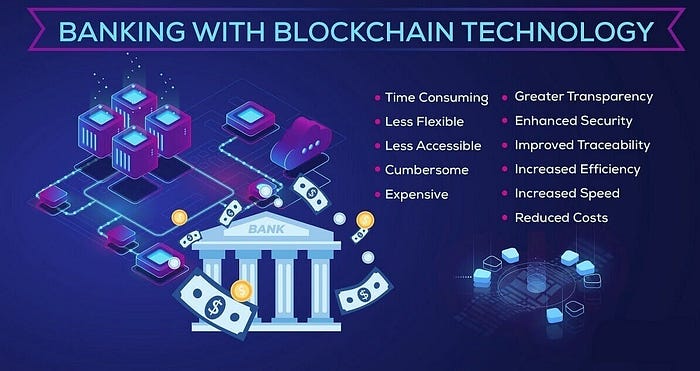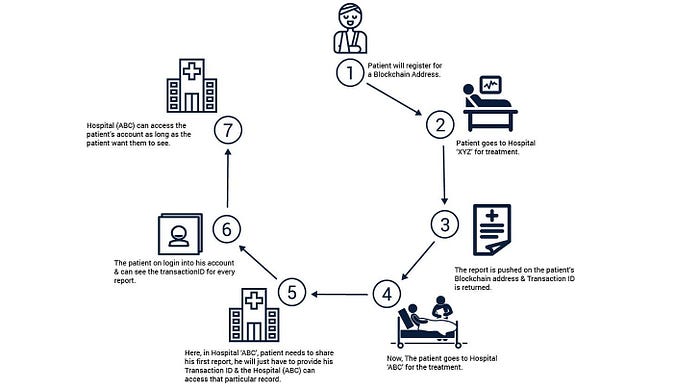CBFS-03: Exploring the Significance of Blockchain: Why It’s More Than Just a Buzzword.
Table of contents
Why Is Blockchain Important for Business?
Now that we understand the importance from a general point of view. Let’s try to understand it from a business perspective. For the most part, it is the business that benefits from blockchain the most. Blockchain is not easy to implement for normal users. It needs to be managed by a team of experts, which makes it ideal for businesses that have the budget and appetite to manage the blockchain project.
The global blockchain market improvement to $20+ billion in 2023 is another sign of how rapidly businesses are adopting blockchain, as per this blockchain presentation.
So, what makes blockchain so lucrative to businesses? First of all, it reduces operational costs. The removal of intermediaries is a boon for business as it not only reduces cost but also reduces the point of contact — improving efficiency and growth.

Transaction speeds are also improved to a new height. For businesses, it is all about efficiency if they can keep their accuracy intact. The use cases are also in favor of business. Some companies have already shown their interest in blockchain. The Dubai Blockchain Strategy is one example where the government wants to change its city with the help of blockchain. They want it to become the first city that will be powered by blockchain.
Blockchain Maturity A Big Concern:
However, businesses know that blockchain maturity is a big concern. Blockchain is a favorably new technology when compared to other technologies. It is also suffering from big challenges and disadvantages of blockchain, including scalability and widespread adoption. Also, blockchain might not be the answer to every industry out there. The finance sector may find blockchain very useful, but not in the art sector. But it doesn’t mean that every sector out there doesn’t benefit from it. The key sectors that can get truly transformed by blockchain include healthcare, transportation, retail, insurance, real estate, and more!
Blockchain As A Service:
Blockchain is a disruptive technology. But it is also expensive to implement and manage. But, with blockchain as a service, businesses with a lower budget can also transit to the blockchain. There are popular blockchain-as-a-service (BaaS) services that are trying to solve the demand.

But what is blockchain as a service?
These are cloud-based solutions, which means that businesses don’t have to worry about infrastructure or maintenance. All they have to do is pay for it like a service. Currently, there are plenty of blockchain-as-a-service providers, but the most notable ones include the following:
Azure Blockchain Workbench
Amazon Managed Blockchain
SAP Blockchain (Cloud Platform Blockchain)
Oracle Blockchain Applications Cloud
AWS (Amazon Web Services), Azure (Microsoft Azure), and Oracle are three major cloud service providers that offer blockchain as a service (BaaS) to their customers. Here’s a basic comparison between the three:
AWS: AWS offers Amazon Managed Blockchain, which is a fully-managed service that allows customers to create and manage scalable blockchain networks using either Ethereum or Hyperledger Fabric. Amazon Managed Blockchain provides a simple and cost-effective way to create and manage blockchain networks in the AWS Cloud.
Azure: Azure offers Azure Blockchain Service, which is a fully-managed service that allows customers to deploy and manage blockchain networks using either Ethereum, Hyperledger Fabric, or Corda. Azure Blockchain Service provides enterprise-grade security and scalability, as well as integration with other Azure services.
Oracle: Oracle offers Oracle Blockchain Platform, which is a comprehensive platform that allows customers to build and manage blockchain applications using either Ethereum or Hyperledger Fabric. Oracle Blockchain Platform provides end-to-end security and scalability, as well as integration with other Oracle Cloud services.
In terms of pricing, all three providers offer flexible pricing models that depend on factors such as network size, data storage, and transaction volume. Overall, each of these platforms has its own strengths and weaknesses, and the choice of which one to use will depend on the specific needs and requirements of the customer.
Why Is Blockchain Important to Different Industry Sectors?
Now that we have understood the importance of blockchain for business. It is now time to reflect upon blockchain’s importance to different sectors. Let’s cover four of them below.
Why Is Blockchain Important in Banking and Finance?

The banking and finance sector can be drastically improved by blockchain. Digital financial institutes have the most benefits when it comes to smart contracts. The benefits come from digital assets, programmable money, and smart contracts. There are plenty of use cases that can be used in the banking and finance sector. Especially, trade finance blockchain has gained a lot of traction in recent times.
Some of them are as below:
Capital markets such as insurance, sales, and trading
Payments and remittances for both domestic and international
Trade finance sectors including bills of lading and letters of credit
Insurance
Investment management including fund launch, administration, and more
There are also a few business benefits, including:
Authenticity: It helps finance institutes bring data integrity and ensure proper authenticity in their systems.
Streamlined Process: It improved operational efficiency, including the ability to do a real-time settlement, reporting, and audit.
Programmable Capabilities: The entire business logic can be coded including data privacy, compliance, identity, and so on.
Economic Benefits: Better operational costs, fewer infrastructure costs, and transactional costs.
Why Is Blockchain Important in Healthcare?

Healthcare is another sector where blockchain will play an important role. Currently, healthcare is suffering from a lack of unity. Patients need to carry their documents, and hospitals put records in separate silos, which takes time to be retrieved when needed. Currently, there are plenty of use cases related to healthcare, including the following:
Patient consent management
Drug traceability
Secure electronic health records (ETRs)
Micropayments Incentivization
Clinical trials data security
Here’s a brief explanation of each:
Patient consent management: In healthcare, patient consent is a critical component of ethical and legal considerations. Blockchain can be used to manage patient consent by providing a secure and tamper-proof record of the patient’s consent. This can help to ensure that patients are fully informed about their treatment and that their consent is respected.
Drug traceability: Blockchain can be used to track drugs from the manufacturer to the end consumer, ensuring that they are authentic and have not been tampered with. This can help to reduce the prevalence of counterfeit drugs and increase patient safety.
Secure electronic health records (EHRs): EHRs contain sensitive medical information and require a high degree of security to protect patient privacy. Blockchain can provide a secure and tamper-proof platform for storing EHRs, ensuring that they can be accessed only by authorized individuals.
Micropayments incentivization: Blockchain can facilitate micropayments, which are small payments that are often impractical using traditional payment systems. Micropayments can be used to incentivize healthy behavior, such as regular exercise or quitting smoking.
Clinical trials data security: Blockchain can be used to secure the data generated by clinical trials, which is often sensitive and confidential. By using blockchain, clinical trials data can be securely shared with researchers and other stakeholders, without compromising patient privacy or the integrity of the data.
Why Is Blockchain Important in Supply Chain?

Supply Chain lacks transparency, accurate asset tracking, and enhanced licensing. Blockchain can improve traceability, transparency, and traceability and have a massive impact on every sector that relies on the supply chain. Right now, products can be hard to track due to the unavailability of real-time tracing. Also, it will become impossible for malicious actors to change goods in any form or factor.
Improved transparency
Traceability
Tradability
Here’s a brief explanation of each:
Improved transparency: Blockchain technology can increase transparency by providing a secure and tamper-proof ledger of transactions. This can help to reduce fraud and increase trust in industries such as finance, supply chain management, and healthcare.
Traceability: With blockchain, every transaction is recorded in a way that is transparent and immutable, allowing for easy tracing of the movement of goods or assets. This can be particularly useful in supply chain management, where it can help to prevent counterfeit goods and improve logistics.
Tradability: Blockchain technology can make it easier to trade assets, such as cryptocurrencies or stocks, by providing a secure and transparent platform for buyers and sellers to conduct transactions. This can help to reduce the need for intermediaries and make transactions faster, cheaper, and more efficient.